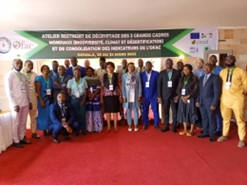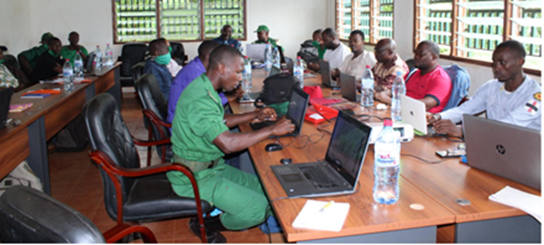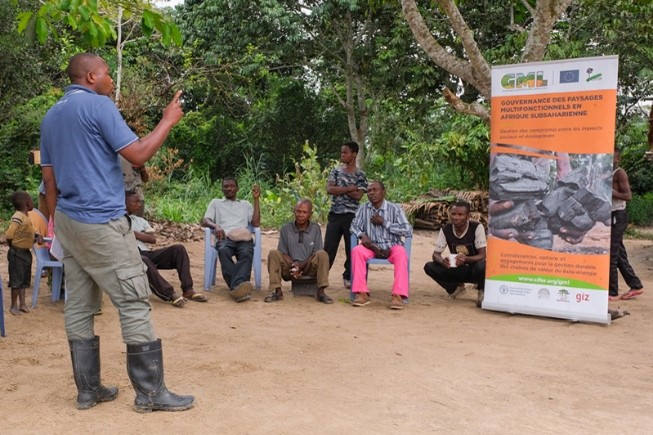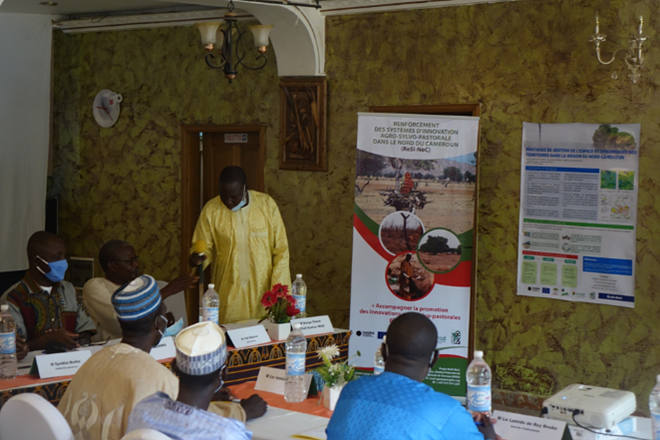
With growing concerns on climate change, poverty, hunger, land degradation and unsustainable supply and value chains, CIFOR-ICRAF strives to build, disseminate and apply evidence about the role of trees, forests and tree-based agriculture as pathways to solving these global crises and to give policy makers the solid base they need to make effective decisions that support both forests and people.
CIFOR-ICRAF’s initiatives to deliver research projects with the greatest potential for impact are possible thanks to the financial support of its funding partners and the collaboration of its strategic partners at local and international levels ranging from governments, private foundations, international organizations, universities to United Nations agencies.
The European Union (EU) is one of CIFOR-ICRAF’s top and longest standing funding partners. Since 1995, CIFOR-ICRAF has implemented well over 37 EU-funded projects on REDD+ benefit sharing, forests and climate change, ecosystem research applications and forest management.
On May 9, the European Commission marked the official start of the Europe Day, with a festival in Brussels connecting various events across Europe and its delegations in Africa. The ‘European Year of Skills’ theme for this celebration puts skills at the heart of the EU policy debate, with a focus on addressing the skills gap, for instance by leveraging national efforts in capacity building and to highlight its commitment to local, national and European stakeholders in different member states.
Through its central Africa regional program, CIFOR-ICRAF has been supporting research and building the capacities of stakeholders it engages with on various topics such as deforestation, forest degradation and adaptation to climate change. Since 2016, with support from national and international partners, the regional program has hosted over 15 interns, supported approximately 35 PhD and MSc students with their thesis research, sponsored over 300 PhD and MSc students and trained over 50 environmental journalists as well as hundreds of smallholder farmers.
Joining the EU in the celebration and in line with this year’s theme, CIFOR-ICRAF’s central Africa program was present at the Yaounde Congress Hall to showcase some of its capacity building initiatives within the EU-funded projects it is implementing on various sites. As of 2023, five main projects are being implemented by CIFOR-ICRAF in central Africa with EU-funding namely : RIOFAC, RESSAC, RESINOC, INNOVACC and GML.
Photos by Merilyne Ojong, Arnauld Chyngwa and Donald Djossi


Since 2007, CIFOR-ICRAF has successfully coordinated and co-led the development and implementation of the Central Africa Forest Observatory (OFAC), a specialised unit of the central Africa Forest Commission (COMIFAC) which supports national and regional tracking of performance on climate commitments through the RIOFAC (Renforcement et Institutionalisation de l’Observatoire des Forêts d’Afrique Centrale) project. With its implementing partners, OFAC now provides policy makers with updated and accessible data on forest resources and forest management as well as capacity building initiatives on the use of tools such as IMET and SENTINEL on its data platform.


The Governing Multifunctional Landscapes (GML) in sub-Saharan Africa project aims to develop and test options for sustainable wood fuel value chains in Kenya, Zambia, Democratic Republic of Congo and Cameroon. In Cameroon specifically, the initiative has been extended to refugee settings in Garoua-Boulaï and Gado-Badzéré bringing host communities and refugees together to engage in participatory tree management and jointly plan for sustainability improvements along the wood fuel value chain and offer. In addition to building beneficiary capacities, this project provides clues on how to integrate wood fuel management in emergency responses, and how to close the gap between humanitarian, development, and environment interventions in displacement settings.


Launched in 2022, the goal of the RESSAC programme (Recherche appliquée en écologie et en sciences sociales en appui à la gestion durable des écosystèmes forestiers d’Afrique centrale) is to direct research towards the “operational solutions” that need to be invented and applied by stakeholders in the field who are confronted with the concrete challenges of sustainable management of natural resources as part of their duties or their everyday socioeconomic activities. Its specific objectives are to organize and support applied research that seeks to strengthen knowledge in social sciences and in ecology on the management and enhancement of natural resources in the forest ecosystems of Central Africa and to promote the use of this knowledge in the operating methods of targeted stakeholders and in the development, implementation and monitoring of public policies and sustainable development assistance programmes in Central Africa. It recently organised two training sessions in Libreville to build the capacities of 50 researchers and members of the civil society on the project management cycle.


The RESINOC (Renforcer les systèmes d’innovations dans le Nord Cameroun) project targets the improvement of the living conditions of the populations in Northern Cameroon through a harmonious and inclusive land management allowing an integration of agricultural and livestock activities as well as the management of natural ecosystems. Its main capacity building initiatives have been the provision of training to farmers on aspects such as nursery techniques and soil fertility improvement, supervision of students, support to innovation niches and the creation of rural resource centers.


The objective of the Innovation for Adaptation to Climate Change (INNOVACC) – project is to increase the productivity and incomes of rural households and to reduce their vulnerability to climate change in the North and Far North of Cameroon. The project adopts a ‘climate-smart villages” approach for co-development, adaptation and dissemination of climate-smart practices and technologies and builds women and youth entrepreneurial skills for green jobs.
ABOUT CIFOR-ICRAF
The Center for International Forestry Research (CIFOR) and World Agroforestry (ICRAF) envision a more equitable world where trees in all landscapes, from drylands to the humid tropics, enhance the environment and well-being for all. CIFOR-ICRAF is a non-profit science institution that generates and applies evidence to meet today’s most pressing challenges, including energy insecurity and the climate and biodiversity crises. Over a combined total of 65 years, we have built vast knowledge on forests and trees outside of forests in agricultural landscapes (agroforestry). Using a multidisciplinary approach, we seek to improve lives and to protect and restore ecosystems. Our work focuses on innovative research, partnering for impact, and engaging with stakeholders on policies and practices to benefit people and the planet. Founded in 1993 and 1978, CIFOR and ICRAF are members of CGIAR, a global research partnership for a food secure future dedicated to reducing poverty, enhancing food and nutrition security, and improving natural resources.
MEDIA ENQUIRIES
Merilyne Ojong
o.nchare@cifor-icraf.org
+237 677223460



